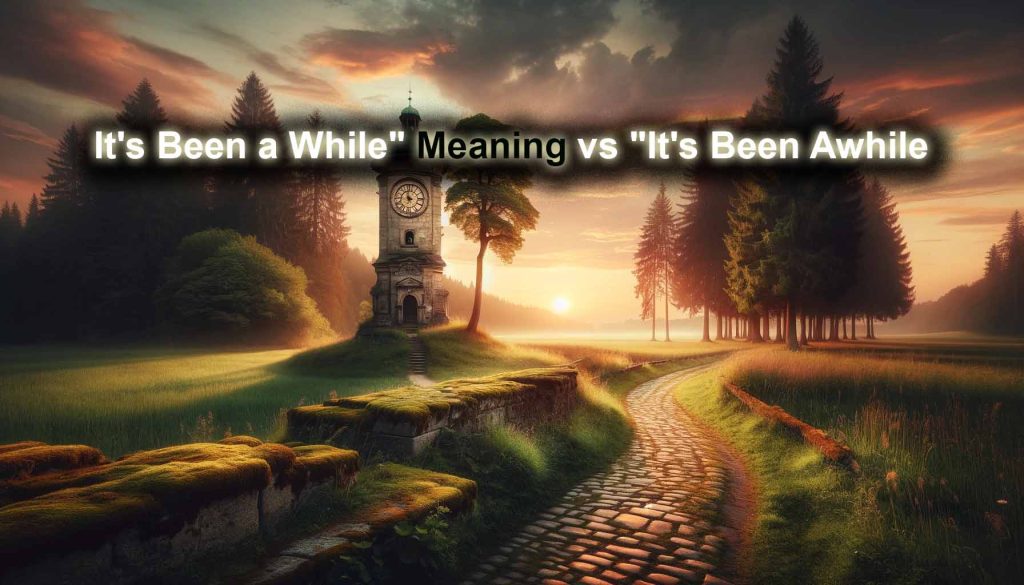
Understanding the Basic Distinction: “Awhile” vs “A While”
Before diving into the multicultural aspects, it’s essential to hold the basic distinction between “awhile” and “a while.” “Awhile” is an adverb, meaning “for a time,” whereas “a while” is a noun phrase that refers to “a period of time.” This fundamental difference is crucial for proper usage in English.
For example, “It’s been awhile” means “It has been for some time,” whereas “It’s been a while” refers to “It has been a period of time.”
“It’s Been a While” Meaning in Hindi
When translated into Hindi, “It’s been a while” captures a sense of passed time since a particular event or experience. In Hindi, this phrase is often expressed as “काफी समय हो गया है” (kāfī samay ho gayā hai), which conveys a similar sentiment of a significant amount of time passing.
This expression is commonly used in casual and conversational contexts, mirroring its usage in English.
“It’s Been a While” Meaning in Urdu
Similarly, in Urdu, “It’s been a while” translates to “کچھ وقت ہو گیا ہے” (kuch waqt ho gaya hai). This phrase in Urdu also reflects a sense of nostalgia or reminiscence, often used when reconnecting with someone or revisiting a place after a long time.
The cultural context in Urdu adds a layer of emotional depth to the phrase, emphasizing the connection between time and human experience.
“It’s Been a While” as a Synonym
In English, “It’s been a while” is often used synonymously with phrases like “It has been a long time,” “It’s been ages,” or “It’s been forever.” These synonyms convey a similar sense of a significant time lapse, but each carries its own emotional and contextual connotations.
Understanding these subtle differences enhances communication effectiveness.
Being a While Meaning
The phrase “being a while” is less common and is often considered a colloquial or non-standard variation of “It’s been a while.” It implies a state of duration or continuation over a period of time.
In both spoken and written English, “It’s been a while” remains the more accepted and widely used expression.
Awhile vs A While Examples
To further clarify the distinction, consider these examples:
- “I haven’t seen you in Awhile.” (Correct use of “awhile” as an adverb)
- “I haven’t seen you in a while.” (Correct use of “a while” as a noun phrase) The context in which each is used can significantly alter the meaning and impact of the statement.
Cultural and Linguistic Considerations
When examining “It’s been a while” across different languages like Hindi and Urdu, it’s evident that cultural contexts play a significant role in shaping the phrase’s emotional resonance.
While the fundamental meaning remains anchored in the concept of time passage, the cultural undertones add richness and depth to its usage.
| Aspect | Details |
|---|---|
| Basic Distinction | “Awhile” (adverb) vs “a while” (noun phrase) |
| Meaning in Hindi | Expressed as “काफी समय हो गया है” (kāfī samay ho gayā hai), indicating a significant time lapse |
| Meaning in Urdu | Conveyed as “کچھ وقت ہو گیا ہے” (kuch waqt ho gaya hai), often with a nostalgic tone |
| Synonyms | Phrases like “It has been a long time,” “It’s been ages” |
| “Being a While” Meaning | Less common, colloquial variation, implies duration |
| Examples: “Awhile” vs “A While” | “I haven’t seen you in awhile” vs “I haven’t seen you in a while” |
| Cultural and Linguistic Considerations | Cultural contexts in Hindi and Urdu add emotional depth |
Conclusion
In conclusion, the phrases “It’s been a while” and “It’s been awhile” offer a window into the nuanced world of language. Whether in English, Hindi, or Urdu, these expressions connect us to the universal experience of time’s passage, each with its unique cultural and emotional suggestions. By understanding these distinctions, we enrich our communication and develop our appreciation for the complexities of language.
Uniting these insights into daily language use not only improves linguistic accuracy but also enhances cross-cultural understanding, highlighting the beauty and range of human expression.

I am Jeremy Jahns – Your Cinematic Explorer
Immerse in movie reviews, Hollywood insights, and behind-the-scenes stories.